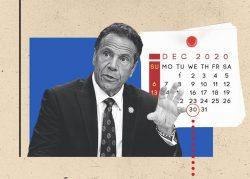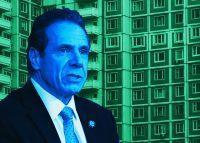With just three weeks left before federal funds dry up and eviction moratoriums run out, details of New York’s expanded rent relief program have yet to materialize — and legislators are mulling taking action.
Landlords welcomed the news last week that Gov. Andrew Cuomo would ease restrictions to qualify for the state’s existing program, but so far, nothing has happened. A spokesperson for the governor previously said that a new executive order was expected last week, but has since stopped returning requests for comment. Some legislators have cast doubt on the idea that Cuomo could rewrite legislation via executive order, even with his extraordinary emergency powers.
According to sources, the state legislature and the governor are set to meet today to hash out a plan to use the funds by the end of the year.
The program was supposed to provide targeted help to tenants who qualified. Instead, more than half of the requests for relief were denied, which left $60 million in available federal funds unspent. The funds would be returned to the federal government if not disbursed by Dec. 30.
Read more



Brian Butry, a spokesperson for the Division of Homes and Community Renewal, which would be tasked with implementing the program, was also unable to provide details on the easing of requirements, but said efforts to expand the program had “not fallen by the wayside.”
The original legislation’s sponsor, state Sen. Brian Kavanagh, in May called the rent relief program a “modest beginning.” He declined to comment on Cuomo’s changes.
Meanwhile, unpaid rent is piling up, and there isn’t much that landlords and tenants can do.
One national survey of market-rate apartments found that a quarter of tenants did not pay any rent in December so far. Some landlords have expressed little confidence that they can make up unpaid rent via evictions, a lengthy process that has become more arduous during the pandemic. And even if a landlord were to evict a tenant, as few have been able to do, it’s not certain that a new, paying tenant would take the previous tenant’s place.
That could explain why eviction filings have been lower this year than in past years, even after it became possible to start the process. Between June and November 2020, there were 28,490 eviction filings, compared to a three-year average of 68,622 over the same period, according to an analysis by the Furman Center.
These are issues that Jaime Cain, coordinator of the Under One Roof coalition, is keenly attuned to. The landlord group formed last year to stave off a statewide rent cap, a signature legislative issue for Brooklyn state Sen. Julia Salazar.
It’s surprising, then, that the group met last month with Salazar, Assembly member Yuh-Line Niou and several tenant advocates in order to hash out differences and find common ground. (Other landlord groups were not present at the meeting.)
“We had a great discussion and yes, have some common discussion points,” Cain said, summing up the tone of the hour-long discussion, which took place over Zoom. The tenant advocates, which included landlord antagonist Cea Weaver, “understand the plight of the small business landlord,” Cain added.
While the discussion hardly amounts to an endorsement of Salazar’s legislation to cancel rent and provide means-tested relief, it is an indication of how high the stakes are for both landlords and tenants who are facing financial hardship.
Legislative sources say that the Senate is expected to take up the issue of evictions before the end of the year, when the current limits on evictions expire — and many expect action before Dec. 18. The Centers for Disease Control’s limits on evictions, enacted in September, expire at the end of the year, as does the applicability of New York’s Tenant Safe Harbor Act, which allows landlords to seek money judgments instead of evicting tenants, provided the resident can document financial hardship.
Two pieces of legislation are currently on the table: A bill sponsored by Kavanagh that would halt the execution of evictions until a specific date (in August, that date was Jan. 20), and one sponsored by state Sen. Zellnor Myrie that would put a moratorium on evictions for a full year after the end of New York’s state of emergency.
Myrie’s bill has 18 cosponsors in the Senate, while Kavanagh’s has 23, although neither has advanced since August. Without additional action from Cuomo, that could change.
“There is a unanimous consensus in the legislature that we must do something to make sure the moratorium is extended,” said Salazar. “What we want is more than just another short-term extension of what we feel is an inadequate moratorium.”
